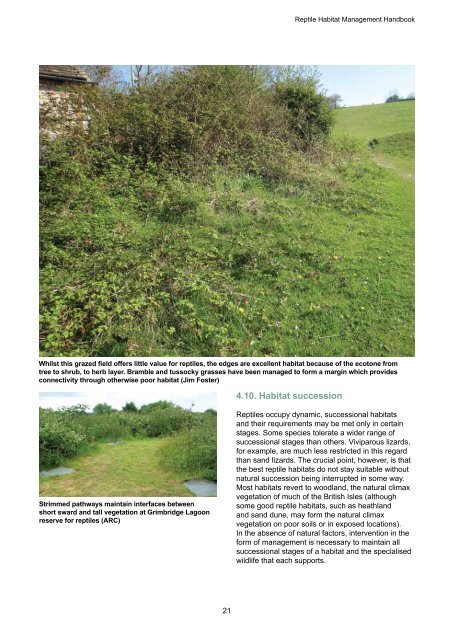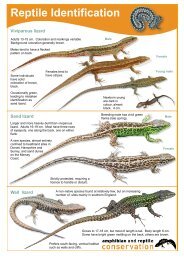reptile-habitat-management-handbook-ffull
reptile-habitat-management-handbook-ffull
reptile-habitat-management-handbook-ffull
You also want an ePaper? Increase the reach of your titles
YUMPU automatically turns print PDFs into web optimized ePapers that Google loves.
Reptile Habitat Management Handbook<br />
Whilst this grazed field offers little value for <strong>reptile</strong>s, the edges are excellent <strong>habitat</strong> because of the ecotone from<br />
tree to shrub, to herb layer. Bramble and tussocky grasses have been managed to form a margin which provides<br />
connectivity through otherwise poor <strong>habitat</strong> (Jim Foster)<br />
4.10. Habitat succession<br />
Strimmed pathways maintain interfaces between<br />
short sward and tall vegetation at Grimbridge Lagoon<br />
reserve for <strong>reptile</strong>s (ARC)<br />
Reptiles occupy dynamic, successional <strong>habitat</strong>s<br />
and their requirements may be met only in certain<br />
stages. Some species tolerate a wider range of<br />
successional stages than others. Viviparous lizards,<br />
for example, are much less restricted in this regard<br />
than sand lizards. The crucial point, however, is that<br />
the best <strong>reptile</strong> <strong>habitat</strong>s do not stay suitable without<br />
natural succession being interrupted in some way.<br />
Most <strong>habitat</strong>s revert to woodland, the natural climax<br />
vegetation of much of the British Isles (although<br />
some good <strong>reptile</strong> <strong>habitat</strong>s, such as heathland<br />
and sand dune, may form the natural climax<br />
vegetation on poor soils or in exposed locations).<br />
In the absence of natural factors, intervention in the<br />
form of <strong>management</strong> is necessary to maintain all<br />
successional stages of a <strong>habitat</strong> and the specialised<br />
wildlife that each supports.<br />
21



